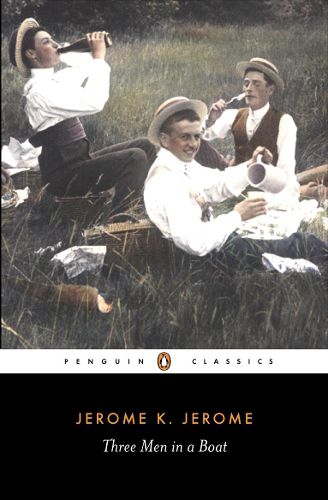Readings Newsletter
Become a Readings Member to make your shopping experience even easier.
Sign in or sign up for free!
You’re not far away from qualifying for FREE standard shipping within Australia
You’ve qualified for FREE standard shipping within Australia
The cart is loading…






A comic masterpiece that has never been out of print since it was first published in 1889, Jerome K. Jerome’s Three Men in a Boat includes an introduction and notes by Jeremy Lewis in Penguin Classics.
Martyrs to hypochondria and general seediness, J. and his friends George and Harris decide that a jaunt up the Thames would suit them to a ‘T’. But when they set off, they can hardly predict the troubles that lie ahead with tow-ropes, unreliable weather forecasts and tins of pineapple chunks - not to mention the devastation left in the wake of J.‘s small fox-terrier Montmorency. Three Men in a Boat was an instant success when it appeared in 1889, and, with its benign escapism, authorial discursions and wonderful evocation of the late-Victorian 'clerking classes’, it hilariously captured the spirit of its age.
In his introduction, Jeremy Lewis examines Jerome K. Jerome’s life and times, and the changing world of Victorian England he depicts - from the rise of a new mass-culture of tabloids and bestselling novels to crazes for daytripping and bicycling.
$9.00 standard shipping within Australia
FREE standard shipping within Australia for orders over $100.00
Express & International shipping calculated at checkout
A comic masterpiece that has never been out of print since it was first published in 1889, Jerome K. Jerome’s Three Men in a Boat includes an introduction and notes by Jeremy Lewis in Penguin Classics.
Martyrs to hypochondria and general seediness, J. and his friends George and Harris decide that a jaunt up the Thames would suit them to a ‘T’. But when they set off, they can hardly predict the troubles that lie ahead with tow-ropes, unreliable weather forecasts and tins of pineapple chunks - not to mention the devastation left in the wake of J.‘s small fox-terrier Montmorency. Three Men in a Boat was an instant success when it appeared in 1889, and, with its benign escapism, authorial discursions and wonderful evocation of the late-Victorian 'clerking classes’, it hilariously captured the spirit of its age.
In his introduction, Jeremy Lewis examines Jerome K. Jerome’s life and times, and the changing world of Victorian England he depicts - from the rise of a new mass-culture of tabloids and bestselling novels to crazes for daytripping and bicycling.
Having just diagnosed himself with every illness in his medical textbook, and feeling generally run down by the grind of the city, the narrator of Three Men in a Boat convinceshis friends, George and Harris, to take a boat ride up the Thames. In agreement that this is just what they all need, they make a list of the essential things to bring – three rugs, a lamp, two flannel suits and plenty of socks (to say nothing of the narrator’s dog Montmorency) – and set off.
As they travel, they digress into memories of all sorts of absurdist situations from their past, dotting the narrative with a series of amusing vignettes. My favourite of these is the narrator’s recollection of carting around a couple of ripe cheeses with a ‘two-hundred horsepower scent’, which he later buries at the beach when he decides they’re too strong, causing that particular seaside town to gain a reputation as a place where ‘weak-chested’ people travel for the strong air.
An extra layer of interest Jerome brings to the story is how he intersperses titbits of British history into the narrative like which bars Queen Bess used to drink at; or how one of the ancient Celtic leaders planted stakes in the river to keep Caesar from crossing it; and how Caesar’s decision to cross it anyway is exactly the kind of gumption the three friends need against the private landowners, who put up notice- boards to keep people from sailing along their portions of the Thames.
I thoroughly enjoyed this ridiculous romp of a story; my only regret is I didn’t find it last year, as its simple escapism would have been a welcome change from lockdown. It was written in 1889, so it has much of the droll wit of other writers of the time, such as Oscar Wilde and J.M. Barrie. While it’s always been published as a book for adults, I imagine this would appeal to any readers of the Victorian classics, adults and children alike.
Explore hundreds of the world's finest works of literature with Penguin Black Classic paperbacks.